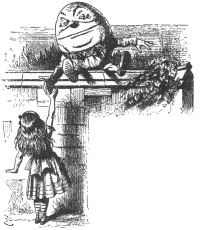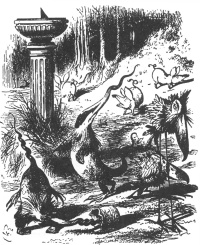Taking guidance from the WatchTower or JW publcations on a matter like this is much like
the conversation between Alice (through the Looking Glass) and Humpty-Dumpty in chapter 6.
You could take almost any segment of the narrative and contemplate it in a JW context.
Consider this exchange:
----------------------------------------------------------------------------------
'I don't know what you mean by "glory",' Alice said.
Humpty Dumpty smiled contemptuously. 'Of course you don't — till I tell you. I meant "there's a
nice knock-down argument for you!"'
'But "glory" doesn't mean "a nice knock-down argument",' Alice objected.
'When I use a word,' Humpty Dumpty said, in rather a scornful tone, 'it means just what I choose
it to mean — neither more nor less.'
'The question is,' said Alice, 'whether you can make words mean so many different things.'
'The question is,' said Humpty Dumpty, 'which is to be master — that's all.'
Alice was too much puzzled to say anything; so after a minute Humpty Dumpty began again.
'They've a temper, some of them — particularly verbs: they're the proudest — adjectives you can
do anything with, but not verbs — however, I can manage the whole lot of them! Impenetrability!
That's what I say!'
ok.'

----------------------------------------------
Get the picture. Literally -er maybe Figuratively. Great illustrations Tenniel.
But let us continue.
------------------
'Would you tell me please,' said Alice, 'what that means?'
'Now you talk like a reasonable child,' said Humpty Dumpty, looking very much pleased. 'I
meant by "impenetrability" that we've had enough of that subject, and it would be just as well if
you'd mention what you mean to do next, as I suppose you don't mean to stop here all the rest of
your life.'
'That's a great deal to make one word mean,' Alice said in a thoughtful tone.
'When I make a word do a lot of work like that,' said Humpty Dumpty, 'I always pay it extra.'
'Oh!' said Alice. She was too much puzzled to make any other remark.
'Ah, you should see 'em come round me of a Saturday night,' Humpty Dumpty went on, wagging
his head gravely from side to side, 'for to get their wages, you know.'
(Alice didn't venture to ask what he paid them with; and so you see I can't tell you.)
'You seem very clever at explaining words, Sir,' said Alice. 'Would you kindly tell me the
meaning of the poem called "Jabberwocky"?'
'Let's hear it,' said Humpty Dumpty. 'I can explain all the poems that ever were invented — and a
good many that haven't been invented just yet.'
This sounded very hopeful, so Alice repeated the first verse:
''Twas brillig, and the slithy toves
Did gyre and gimble in the wabe:
All mimsy were the borogoves,
And the mome raths outgrabe.'
'That's enough to begin with,' Humpty Dumpty interrupted: 'there are plenty of hard words there.
"Brillig" means four o'clock in the afternoon — the time when you begin broiling things for
dinner.'
'That'll do very well,' said Alice: 'and "slithy"?'
'Well, "slithy" means "lithe and slimy". "Lithe" is the same as "active". You see it's like a
portmanteau — there are two meanings packed up into one word.'
'I see it now,' Alice remarked thoughtfully: 'and what are "toves"?'

'Well, "toves" are something like badgers — they're
something like lizards — and they're something like
corkscrews.'
'They must be very curious-looking creatures.'
'They are that,' said Humpty Dumpty; 'also they make
their nests under sun-dials — also they live on cheese.'
'And what's to "gyre" and to "gimble"?'
'To "gyre" is to go round and round like a gyroscope.
To "gimble" is to make holes like a gimlet.'
'And "the wabe" is the grass-plot round a sun-dial, I
suppose?' said Alice, surprised at her own ingenuity.


